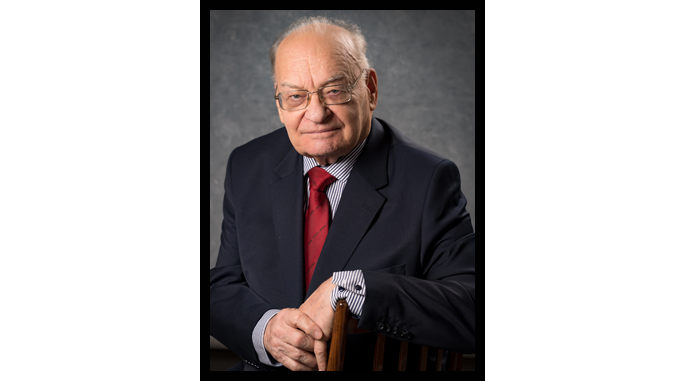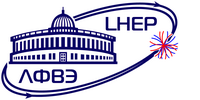
On July 8, 2023, Professor Igor Alekseevich Savin, Honorary Director of VBLHEP, Honoured Scientist of the Russian Federation, passed away. He was a scientist with a worldwide reputation, a man who created the glorious history of our Institute and world science. Carlo Rubbia, Nobel Laureate in physics, wrote to Igor Savin on his 90th birthday: “Igor, your anniversary celebration represents for all of us a unique result to which we have been involved over many decades and of which we are extremely proud”.
Igor Alekseevich Savin was born on December 7, 1930 in Dyatkovo, Bryansk region. In 1949, after graduating from school with a gold medal, he entered the Faculty of Physics in Lomonosov Moscow State University, from which he graduated with honors in 1954. On February 19, 1955, he started his work in Dubna: first at the Electrophysical Laboratory of the USSR Academy of Sciences, and after the formation of JINR – at the Laboratory of High Energies.
In the early years of his work at LHE, he was engaged in the development of detectors designed to identify particles in experiments at the Synchrophasotron. Then, for the first time in the USSR, antiprotons were discovered using these detectors. Two years later, Igor Savin proposed an experiment and studied the backward elastic scattering of positive pions by protons at the Synchrophasotron, discovering the peak in the scattering of mesons at angles close to 180 degrees predicted by I.Ya. Pomeranchuk.
Igor Savin gained international prestige by studying interference in K-meson decays in experiments at CERN, which confirmed the violation of CP invariance. In 1967, he defended his PhD thesis based on the results of his work, and in 1974 – his Doctoral thesis. The last one included the results of studying kaon regeneration that became classical and were entered into the world data tables. To obtain them, the BIS spectrometer was constructed and an international Collaboration including physicists from Bulgaria, Hungary, Czechoslovakia and the GDR was formed under the leadership of Igor Savin. The Collaboration conducted a series of experiments at the U-70 accelerator in Protvino. It was found that the regeneration cross-section decreases with the increasing momentum of K-mesons according to the Pomeranchuk theorem on the asymptotic equality of total cross sections for particles and antiparticles.
The successful implementation of the first large-scale joint JINR-CERN project in 1974-1990 was fully due to the enthusiasm, brilliant organizational talent and initiative of Igor Savin. He led the JINR group participating in this joint experiment NA-4 at the SPS accelerator on the study of deep inelastic scattering of muons on nucleons and nuclei. As a result of the research, the γ/Z interference in the electroweak interactions of muons on nuclei was established, indicating the existence of an intermediate Z-boson discovered at CERN a year and a half later; the structure functions of protons and deuterons were measured with high accuracy (1.5%) and were included in the world database of elementary particles; the behavior of structure functions was shown to be in agreement with the QCD theory, the parameter of the QCD theory was determined with the highest accuracy at that time; it was proved that the structure functions of free and bound nucleons in the nucleus differ. In 1977, Igor Savin became a professor. The first equal cooperation with CERN contributed to the development at JINR of the most advanced technology for construction and mass production of modern elementary particle detectors, the introduction of the novel tools and methods for experimental data processing, and the establishment of strong collaboration with the world scientific community. This cooperation made it possible to fulfil the scientific and methodological potential of JINR and contributed to increasing the visibility of our Institute.
Igor Savin founded a new scientific direction at JINR – experimental and theoretical study of the spin structure of nucleons and nuclei, it has become the main content of his scientific papers in recent years. This direction, thanks to the active support of Igor Savin, has been successfully developing for many years, as well as in planned experiments of the accelerator complexes CERN, BNL, JLab and NICA. Igor Savin headed the JINR group in the NA-47 experiment (SMC), in which the spin-dependent structure functions of protons and deuterons were measured and it was found that valence quarks make a small (about 20%) contribution to the spin of nucleon. Igor Savin led the JINR team in the NA-58 experiment (COMPASS) at CERN and actively participated in the HERMES experiment at DESY (Germany) to further study the nucleon spin structure in electron scattering reactions on longitudinally and transversely polarized nucleons.
During many years of his work at LHE JINR, Igor Savin held the positions of head of the sector, head of the department. In 1989, for the first time in the history of JINR, he was elected by the JINR Scientific Council on an alternative basis as Director of the new Laboratory of Superhigh Energies. The main task of the Laboratory was to perform research at external accelerators at IHEP, CERN, DESY, RICH and other world centers. As the director, Igor Savin paid great attention to the development of international scientific cooperation, the scientific and methodological base of the Laboratory. Eight PhD theses were defended under his supervision. For many years he headed the Laboratory’s Dissertation Council, worked as a professor at the Department of Physics of Elementary Particles, Faculty of Physics, Moscow State University.
In 2007, Igor Savin was awarded the title of “Honored Scientist of the Russian Federation”. He was the author of about 400 scientific publications, he was awarded the JINR prizes for the best scientific papers 10 times. Igor Savin was awarded the Order of Honor, the Medal of the Order “For Merit to the Fatherland”, the Medal “For Valiant Labor”, the Medal of St. George “Honor. Glory. Labor”, the badge of the Governor of the Moscow region “For Labour and Diligence”, the distinction badge “Academician I.V. Kurchatov”, the gold medal of the Czechoslovak Academy of Sciences, the medals of the Hungarian People’s Republic and the GDR, other awards and titles.
A talented scientist with a worldwide reputation, a kind, sincere, reliable person, a wise adviser passed away. He left, leaving a deep mark on science and a bright memory for everyone who knew him, for whom he was and remains a man to look up to. It is a great honor and pride for us to call Igor Savin our friend, colleague, and Mentor.
JINR and VBLHEP Directorates and the Laboratory employees express their sincere condolences to the family and friends of Igor Savin. The bright memory of a wonderful man and a true scientist will always remain with us.
